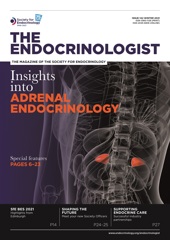Robert Semple is Chair of Translational Molecular Medicine at the University of Edinburgh. He also does outpatient clinical work in diabetes and endocrinology for NHS Lothian. In addition to overseeing biomedical PhD training, he spends most of his time running a research programme. His research focuses on how insulin signalling and fat tissue work in health, and how this goes wrong in disease. His research starts with, and focuses on, people with rare and severe types of disease, often caused by changes in a single gene. To investigate these fully, his lab also studies cells and model organisms.
What inspired you to take up research?
I can’t imagine not wanting to solve puzzles, and I have always found the diagnostic process hugely rewarding. I see my research as an extension of this. Instead of being constrained by established wisdom (sometimes wrong) and available clinical tests, I like to take tricky diagnostic problems into the research lab and try to think, with my team, of ways to uncover the truth. I am always alert to lazy diagnostic thinking that doesn’t stand up to rigorous scrutiny.
As for endocrinology, I was studying biochemistry and molecular biology just when the way insulin works on cells was being discovered. This fascinated me scientifically and, when I learned more in subsequent clinical training about the poorly understood, but enormous, medical problem of type 2 diabetes, I was hooked. Mind you, I still remember the snort of derision from a consultant general surgeon when I told him, in the operating theatre as a student, that I already wanted to be an endocrinologist!
We all need to get out and make the case to students and junior doctors for our specialty, and also make it easy for the brightest scientists, who are mobile among disease areas, to identify themselves as endocrine researchers.
What are you proudest of in your career, so far?
Goodness, that’s a question I’d rather defer to my retirement! Honestly, it is the contribution to the all-round enterprise – clinical care, teaching, and research – that I am most proud of. But every time we have discovered a new cause of a disease (usually genetic) it has been particularly exciting and satisfying, especially where this has given insights into human biology and suggested routes to treatment.
Recent examples have been identification of changes in insulin signalling genes that leave them ‘stuck on’, causing severely low blood glucose or excess tissue growth. Unlike many genetic discoveries, these findings suggested immediate new options for treatment, in this case with drugs which were initially developed for cancer. These are currently working through clinical trials.
What are the main challenges for endocrinology and the Society?
These must be recruitment and retention of the brightest and best clinicians and scientists.
Endocrinology is a wonderful and diverse specialty full of big unanswered questions and terrific science, but it now competes with other disciplines, where exciting advances are also being made. The best of the specialty can sometimes be hidden from clinical trainees by the demands of routine, ward-based care. So, we all need to get out and make the case to students and junior doctors for our specialty, and also make it easy for the brightest scientists, who are mobile among disease areas, to identify themselves as endocrine researchers.
What do you hope to achieve during your term?
I inherit a really good team and a robust system for assembly of the SfE BES programme from Duncan, which includes strong input from the Endocrine Networks. So, no revolution is required. However, it is crucial to pick up strongly after the long COVID-19 hiatus with the most exciting programme possible, and to constantly look out for any emerging areas of interest where we can introduce fresh content and formats. If SfE BES is still a highlight of the year for clinical colleagues, endocrine scientists and all types of trainees in three years, then my job will have been done!
Why did you get involved with Society governance, and why should others?
It was enjoyment and duty, wrapped up together. Putting together the SfE BES conference means working with interesting colleagues and horizon-scanning the best endocrine science and clinical practice, and is intrinsically rewarding.
There is pressure too, of course, to continue to find the balance that satisfies all types of member, but I fundamentally believe that, having taken so much from SfE BES over the years, it is right to try to contribute something back, so that others can have the same experiences. Anyone who has enjoyed SfE BES, especially if they have spotted things they think could be improved, should try to get involved. It’s our meeting and it is what we make it!
Any words of wisdom for aspiring endocrinologists?
Treat people, not diseases, and value the insights of colleagues. But when you see something that you don’t understand, or that doesn’t seem to fit with conventional wisdom or the algorithm of the moment, don’t be too respectful. Ask the difficult questions and point out that ‘the emperor is wearing no clothes’, when necessary!






